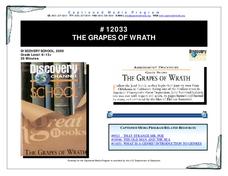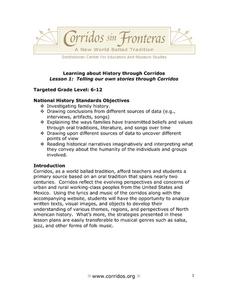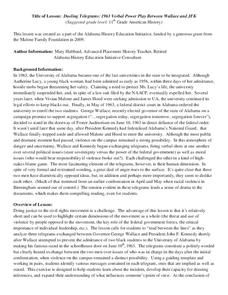Alabama Department of Archives and History
Conflict in Alabama in the 1830s: Native Americans, Settlers, and Government
To better understand the Indian Removal Act of 1830, class members examine primary source documents including letters written by Alabama governors and the Cherokee chiefs. The lesson is part of a unit on the expansion of the United...
Alabama Department of Archives and History
Alabama's New South Era
The industrialization and urbanization of Alabama during the New South era (1865-1914) is the focus of a lesson that asks class members to use primary source documents to examine the impact of industrialization on Alabama workers and...
Captioned Media
Creating Dramatic Monologues from The Grapes of Wrath
Set in Oklahoma in the 1930s, The Grapes of Wrath presents a powerful view of life during the Great Depression. An insightful lesson plan takes a closer look at the characters in John Steinbeck's classic novel, combining the descriptions...
NET Foundation for Television
1850-1874 Homestead Act Signed: Who were the Settlers?
Life in the great, wide-open spaces of the West! Scholars analyze the reasons behind the vast movement to the Great Plains after the passing of the Kansas-Nebraska Act and the Homestead Act. Using photographic, document, map, video, and...
Alabama Department of Archives and History
Convict Leasing in Alabama: a System That Re-Enslaved Blacks After the Civil War
The post-Civil War convict leasing program, rarely covered in textbooks, is the focus of a lesson that asks class members to use information drawn from primary source documents to assess the program. While the focus is on Alabama's...
Alabama Department of Archives and History
Alabama's 1901 Constitution: What Was at Stake?
Who should be able to vote? As part of a study of the 1901 Alabama Constitution, class members examine primary source document that reveal the reasons the authors gave to support their positions on this question and their assumptions in...
Alabama Department of Archives and History
Alabama's Secession in 1861: Embraced with Joy and Great Confidence. Why?
From December 20, 1860 to June 8, 1861, eleven states seceded from the Union. Alabama seceded on January 11, 1861. Why did so many white Alabamians want to secede? Why did they believe the South could win the war? These are the essential...
Alabama Department of Archives and History
Cells for Sale - Convict Leasing in Alabama
The benefits and drawbacks of convict leasing following the Civil War are the focus of a instructional activity that asks groups to examine primary source materials to gain an understanding of the program before individuals decide...
Alabama Department of Archives and History
The Wrong Side of History: How One Group Justified Its Opposition on the Freedom Riders and Civil Rights for African Americans
Designed as a supplement to the study of the Freedom Riders, this resource uses primary sources to reveal the views of those who opposed the Freedom Riders. After careful study of the arguments presented by the members of the Montgomery...
Curated OER
Introduction to Age of Absolutism
Who were the absolute monarchs of Europe and what effect did they have on their countries? Young historians begin by naming qualities they believe are important for a monarch to possess. They then take notes on four key factors leading...
Alabama Department of Archives and History
"Scottsboro Boys": A Trial Which Defined an Age
Here's a must-have resource. Whether your focus is racism, the Great Depression, the "Scottsboro Boys" trial, or part of a reading of To Kill A Mockingbird, the information contained in the seven-page packet will save hours of research...
Curated OER
Letters from the Japanese American Internment
Students delve into primary research. In this Japanese Internment lesson plan, students make deductions about life in an internment camp by reading and comparing letters written to Clara Breed. Along the way, they consider the advantages...
Center for History Education
Did Southern Free Men of Color Fight for the Ideals of the South?
Much of history is distasteful. Primary sources often reveal attitudes acceptable at the time that no longer are. But to understand controversial historical events, historians must examine primary sources that represent a wide variety of...
PBS
African American History: Climbing the Wall
Imagine the challenge of trying to trace your family genealogy if no records were kept of births and deaths. Where would you look for information? What types of documents could provide you with the information you seek? History...
Alabama Department of Archives and History
Strange Fruit: Lynching in America
To continue their study of the Civil War, Reconstruction, and the beginning of the civil rights movement, class members watch the YouTube video of Billie Holiday singing "Strange Fruit" as an introduction to an examination of lynching in...
Curated OER
Passing Down Family History Through Oral Tradition: Corridos
Students create and perform Corridos which are oral tradition ballads. In this Passing Down Family History Through Oral Tradition lesson, students interview family members using a predetermined list of questions. In addition, students...
Curated OER
A Heritage Study: Using Information Resources to Research Family History and Traditions
Students research their family history through ethnographical study. They locate information through a variety of sources, interview people, write a report and present an oral presentation to the class.
Curated OER
Geography, Climate, and Community in the Dominican Republic
Young scholars examine primary source materials on the Dominican Republic in an exploration of how environment influences lifestyles. They compare and contrast life in the Dominican Republic with life in the United States.
Alabama Department of Archives and History
Alabama Tenant Farmers and Sharecroppers, 1865 to Present
The tenant farming and sharecropping systems that developed in the South after the Civil War, the reasons for their development, and the eventual decline of these systems are the focus of this two-day plan.
Alabama Department of Archives and History
The Great Depression - Hard Times Hit America
To gain an understanding of how the Great Depression affected everyday citizens, class members examine letters written either to the president or to the governor of Alabama asking for assistance.
Teaching Tolerance
Thanksgiving Mourning
Two primary sources, a speech, and an article provide tweens and teens with different perspectives of the American Thanksgiving holiday. After analyzing Wamsutta James' suppressed speech and Jacqueline Keeler's article, class members use...
Alabama Department of Archives and History
Dueling Telegrams: 1963 Verbal Power Play Between Wallace and JFK
Information, inferences, and innuendos. Text and subtext. Class members examine telegrams exchanged between President John F. Kennedy and Alabama Governor George Wallace, studying both what is stated and what is implied by the diction...
Curated OER
Family Newscast
Students report on family trends, functions of the family and various ways of selecting marriage partners. In this family lesson plan, students act as editors, commercial skits, and writers for a newscast about families.
Angel Island Immigration Station Foundation
Exploring Oral Histories of Angel Island Immigrants
Empowered by the previous lesson where they interviewed a family or community member, young historians examine Angel Island immigrants' oral histories. They use a matrix to record their interpretation of the feelings of the immigrant....

























